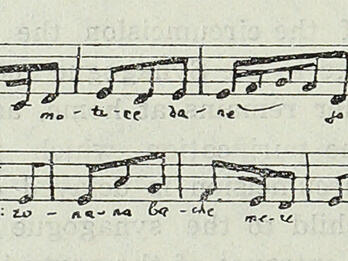Letter against Zionism
With the Grace of God, Sunday, [the week of parshat] Beshalaḥ 5658 [1898], Sighet
To my honorable friend, the famous sage, who is both rooted in the knowledge of [Torah from Mt.] Sinai and who uproots mountains with his intelligence, the most beloved, the finest of incenses, the glory of the Torah, our teacher and rabbi, R. Yesha‘yah Silbershtain,1 may his light keep shining, the head of the rabbinic court in the holy community of Waitzen [Vác, Hungary].
I received a letter in your name, forwarded by the honorable Mr. David Katzburg2, regarding the new movement [Ḥoveve Tsiyon] that has only recently been formed, in which those who have abandoned the Torah gather in groups called Ḥevrat ohave Tsiyon ve-Yerushalayim [Lovers of Zion and Jerusalem], whose purpose is to purchase fields and vineyards in our Holy Land and to bring our Jewish brothers there to settle and cultivate the land so that they may eat its fruits and enjoy its wealth. And while I understood from his letter that the writer has not yet joined with these sinners and heretics who are involved with this issue, still, their heresy has entered his mind to some level, and he stumbled in writing ear-splitting things in his letter. He says, for example, that our situation today is different from that of the israelites in Egypt, for then we were united and thus deserving of miracles, while today, when we are divided—some here and some there—we must engage in natural endeavor [i.e., not await miraculous or messianic deliverance but engage in this-worldly activity]. I thought to myself: Do not answer [a dullard in accord with his folly] (Proverbs 26:4), for according to his approach we have to lose all hope, and—heaven forbid—we will find ourselves eternally mired in exile if we do not resort to human action and natural means. For this reason, I turn my response only to you: You should be aware that no sweetness can come from bitterness, and no goodness or redemption can come to the Jewish people through these sinners and heretics. They do not truly desire to improve the condition of our Jewish brothers, but to remove from their hearts the belief in the Messianic redemption—heaven forbid—in claiming that they will rebuild the ruins of Jerusalem and bring back our judges as of old, and so forth. One of their emissaries came to our city and in his public address, and by means of his smooth-talking, attempted to establish a group here, but thank God I stood in his way, preventing him from carrying out his evil plan—and so he left the way he came. I have already received questions about this matter from other places and I have responded that it is absolutely forbidden to join this group, whose leadership is made up entirely of heretics and nonbelievers. I therefore ask you to warn the above-mentioned publisher [David Katzburg]: Be very careful so as not to take such a step, and do not even mention it in the journal Tel talpiyot, so that we will not have to publicly raise our voice against it [Zionism, and thus draw any attention to it].
And God who is good will rebuild our Temple and will restore our people shortly in our days.
These are the words of one who looks forward to the elevation of the light of the Torah and the people of Israel by means of God’s redemption soon and quickly.
With love,
Ḥananya Yom Tov Lipa Teitelbaum
Notes
[Yesha‘yah Zilbershtain (1857–1930), influential Orthodox Hungarian leader and rabbinic judge in Vác (near Budapest) who lent his support behind Katzburg’s Tel talpiyot periodical.—Eds.]
[David Tsvi Katzburg (1856–1937), the founding editor and publisher of the Orthodox Hebrew bi-monthly journal Tel-Talpiyot (1892–1945). It is likely that this letter was an editorial by Akiva Yosef Schlesinger (1837–1922) on Zionism, published in Tel talpiyot.—Eds.]
Credits
Kedushat Yom Tov (Ḥananyah Yom-Tov Lipa Teitelbaum), letter [Letter against Zionism], republished in Naftali ben Menachem, Mi-sifrut Yisra’el be-Hungariyah (Jerusalem: Kiryat Sefer, 1957/8), p. 85.
Published in: The Posen Library of Jewish Culture and Civilization, vol. 7.



